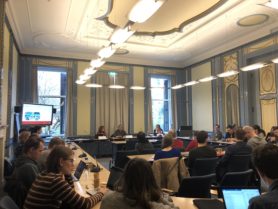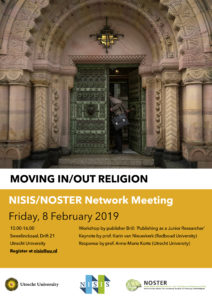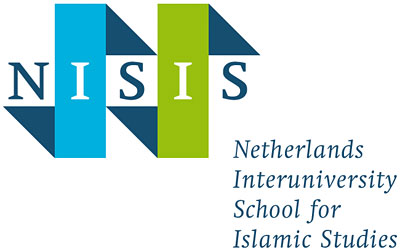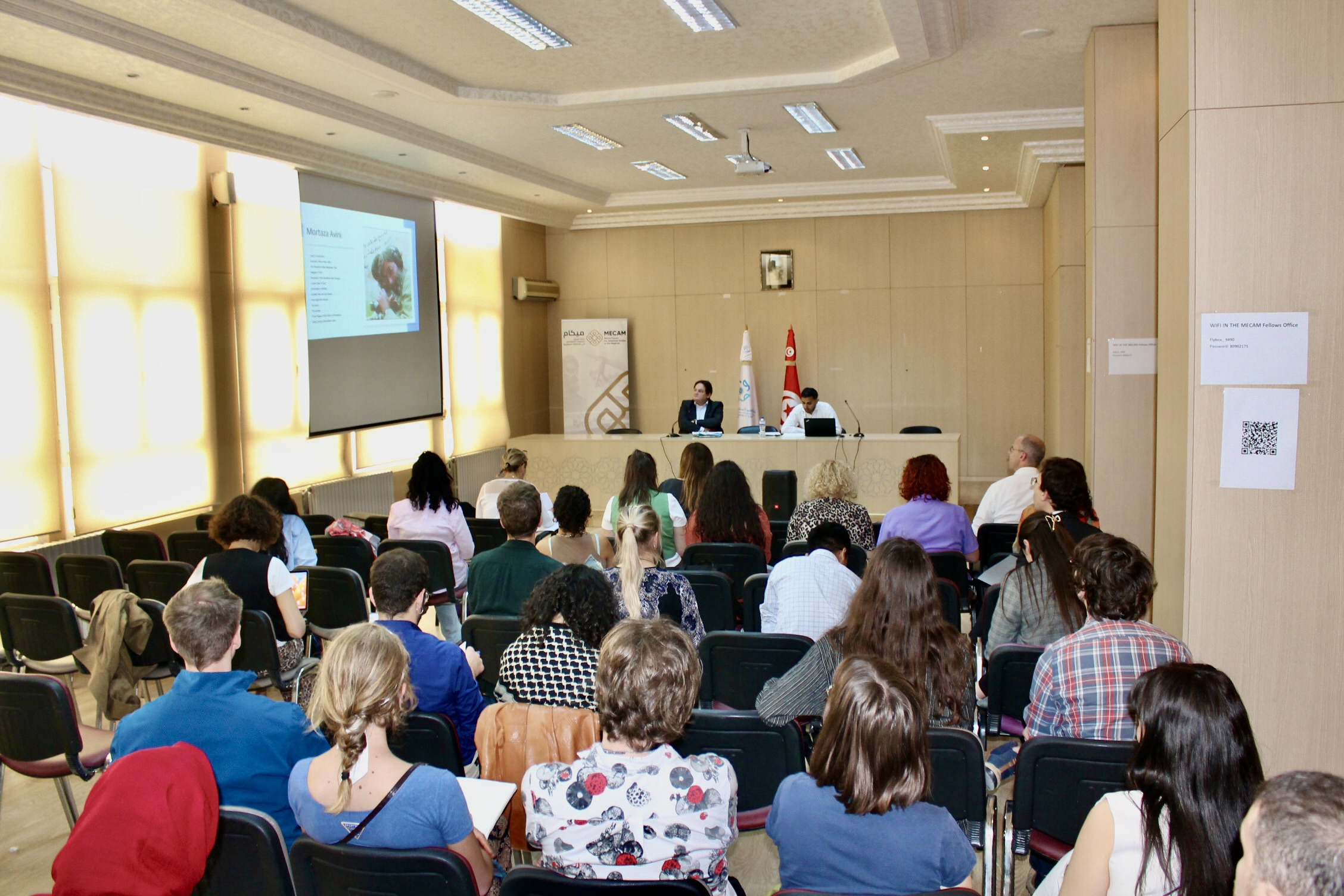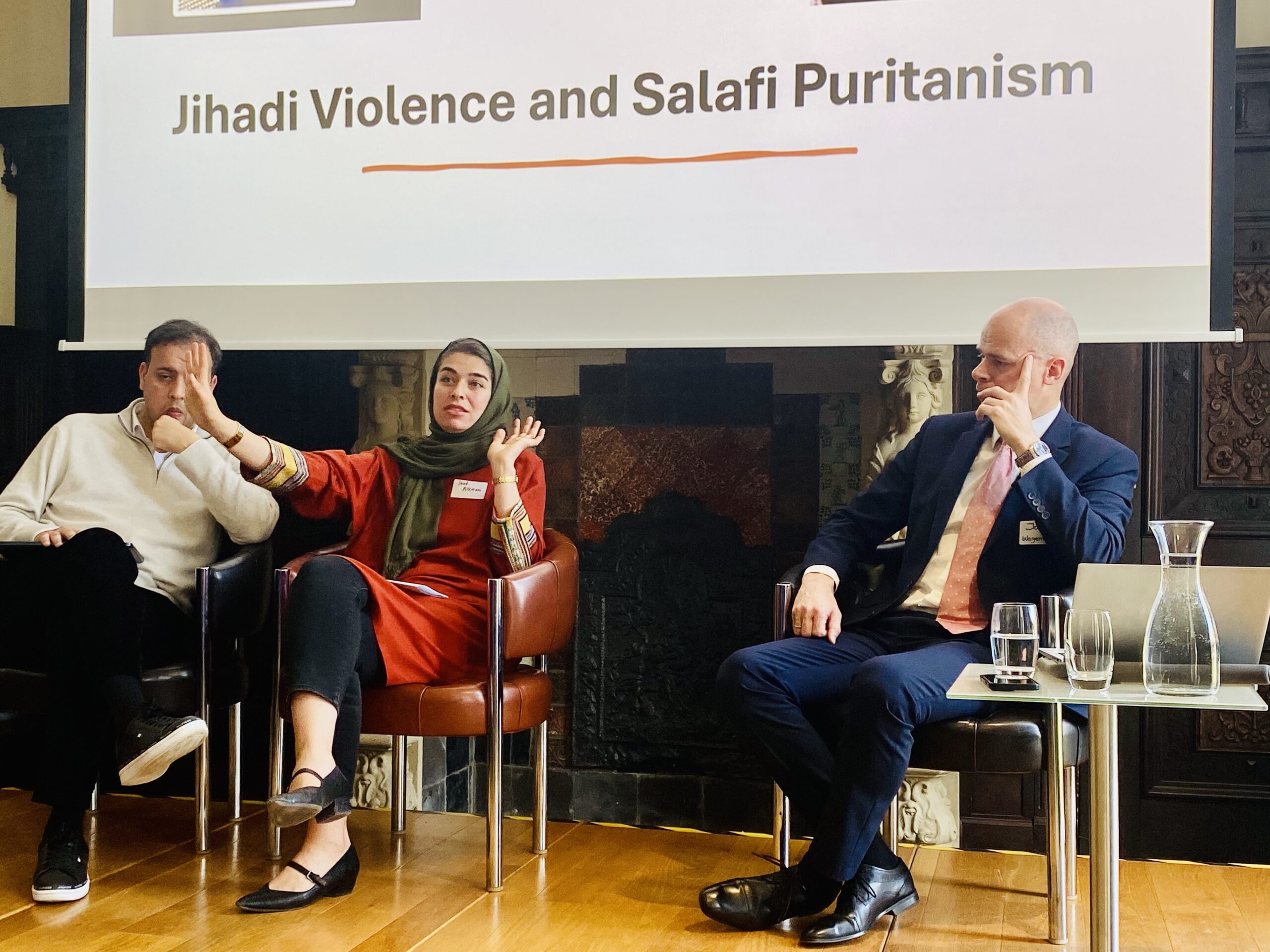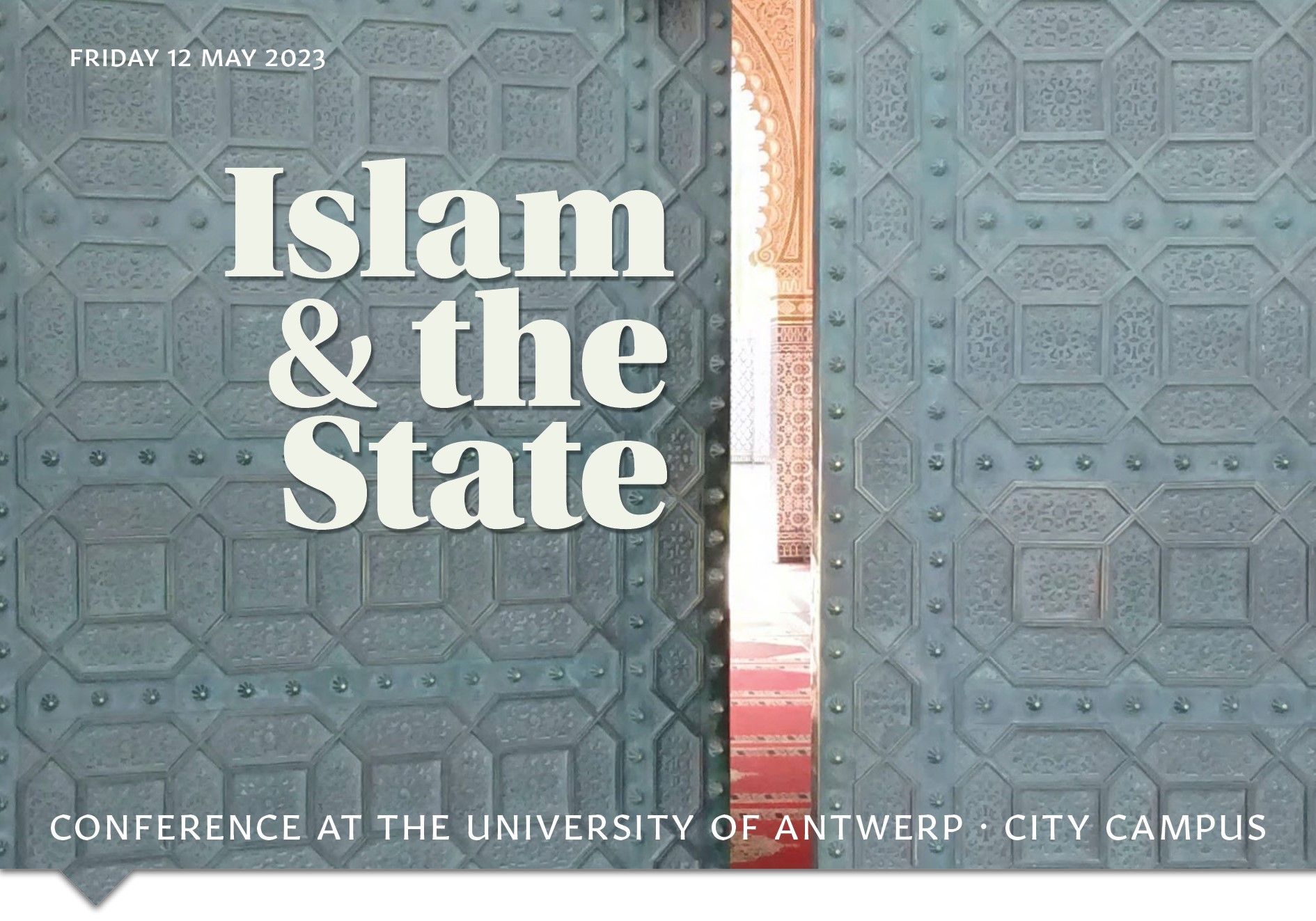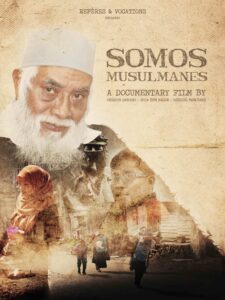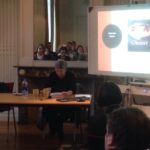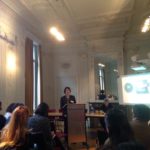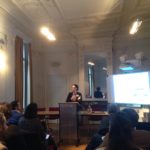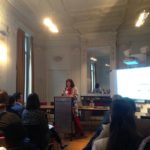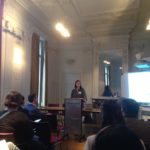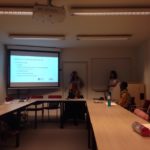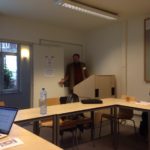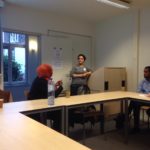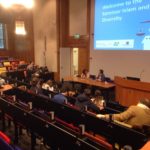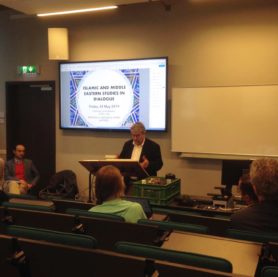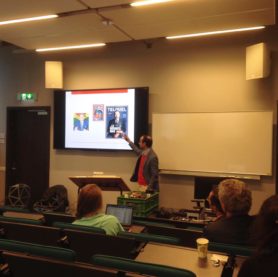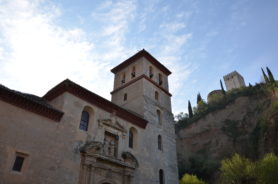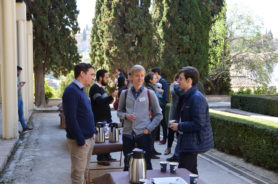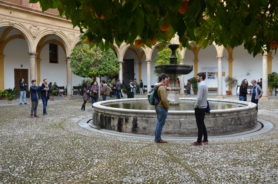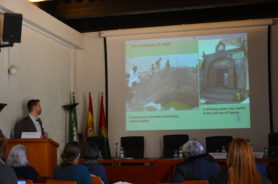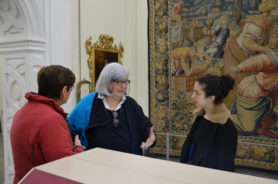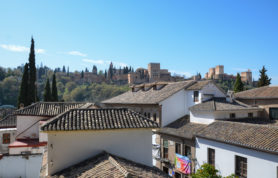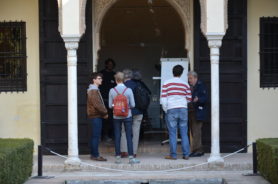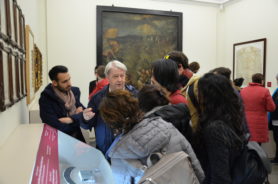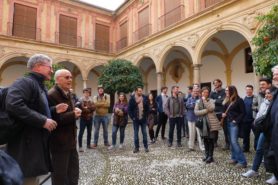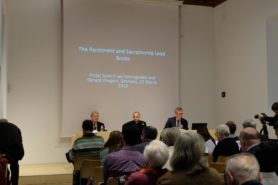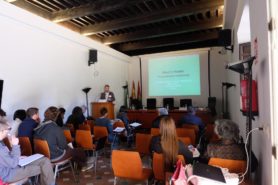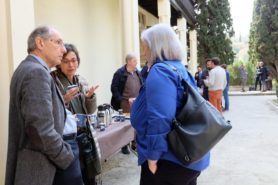Past Events
ENIS Spring School ’25: ‘Imagining Futures: Dealing with Disparity‘, 27 – 30 May, 2025
Every year, the Netherlands Interuniversity School for Islamic Studies (NISIS) organises a Spring School in collaboration with our partners from several European countries in the framework of the European Network for Islamic Studies (ENIS). This year, our Spring School took us to Tunis, the capital of Tunisia, where we were hosted at the University of Tunis and organised around the theme of “Imagining Futures: Dealing with Disparity”. On Tuesday, the first day of the Spring School, we were welcomed by a representative of the Faculty of Human and Social Sciences at the University of Tunis, Amel Guzani, the director of the Merian Centre for Advanced Studies in the Maghreb (MECAM) hosted by the University of Tunis, Julius Dihstelhoff, and the director of NISIS, Joas Wagemakers, who spoke on behalf of ENIS.
Content-wise, the event was kicked off by Jörg Matthias Determann (Virginia Commonwealth University in Qatar), who gave a fascinating keynote lecture about “Imagining Futures in Muslim Societies”, using science-fiction literature and utopian visions of the future from Saudi Arabia, Iran and beyond. He also showed how these developments are viewed quite differently from an Islamic point of view, with some presenting themselves as clear opponents to science fiction films and literature, while others engage in it themselves. This presentation generated a lot of questions and discussion and ensured that we were off to a very good start, which was continued by interesting presentations by (R)MA-students and PhD-candidates on, among other subjects, aspirations and visions for the future, focussing on education in Germany, cinema in Iran and urban life in Cairo.
After a nice lunch, we started the afternoon session with a keynote lecture by Albrecht Fuess (Philipps University Marburg), which focussed on Muslims in Europe. Presenting numerous statistics on Muslims in France, Germany and Great Britain since the twentieth century, he pointed to various factors that have shaped and influenced the life and development of Islamic communities in Europe. This culminated into five different future scenarios, of which he deemed “co-existence” the most likely. This presentation was followed by sessions on “Disparities in European Muslim Communities” and “Disparities in Arab Writings” by (R)MA-students and PhD-candidates, which included talks on racism in Tunisian literature, identity formation among Muslims in Lithuania and Islam among second/third-generation Turkish immigrants in Germany.
The second day of the ENIS Spring School was dedicated to an excursion to the old city of Tunis. Under the capable supervision of a very knowledgeable guide, we visited various mausolea, bathhouses, madrasas and a former synagogue, all of which to varying degrees betrayed the influences from various cultures that have affected Tunisia throughout the centuries. This not only showed Tunisia’s long history, but also the numerous dynasties of varying cultural and religious backgrounds that dominated the country and the region. This was even more clearly displayed in the Bardo Museum, which we visited in the afternoon. Housed in a building whose ceilings and walls were a wonderful mix of cultural, religious and architectural styles, the guide showed us some beautiful mosaics that had mostly been amazingly preserved.
On day three of the Spring School, we started our programme with a keynote lecture by Hayet Amamou (University of Tunis), whose talk was a welcome addition to what we learned during our excursion the day before. In her lecture, Professor Amamou focussed on the mobility of people in the Maghreb over the centuries prior to the colonial period and sought to trace the material and immaterial heritage of the displacement of people before French rule of the region. This was followed by presentations by (R)MA-students and PhD-candidates in two different sessions and which included papers on the Muslim community in Linxia (China) under Xi Jingping’s presidency, headscarves and the future of women in India and identity preservation among Sahrawis.
After lunch, Maurits Berger (University of Leiden) talked about “Muslim Future(s)”. His keynote lecture focussed on how an enormously varied Muslim community in Europe is working its way towards the future, what that future entails and whether there is even a clear image of a desired future. Central in his talk was the notion of imagination, which is a much broader, more creative and more positive way of looking at the future than the problem-based and more negative approach that often underpins discussions of the future. This talk provoked a lot of discussion among participants, which spilled over into the break. The next session consisted of presentations by (R)MA-students and PhD-candidates and included talks on the role of women in the Jordanian Muslim Brotherhood, the call for equality within the Egyptian branch of the same organisation, water management in northeastern Tunisia, visions for the future and their legal implications in Algeria and European exploitative ecological policies in Algeria.
The fourth and final day was kicked off by Asma Helali (University of Lille), who gave a keynote lecture on a new approach to the founding textual sources of Islam: the Qur’an and the hadith. After a brief historical overview of the canonisation of the Qur’an and the development of seven different readings (qira’at) within Sunni Islam, she showed us a number of Qur’anic fragments. Rather than focussing on the actual texts, however, she put the focus on signs, notes, corrections, comments and colours (paratext) added to the texts themselves to offer a new perspective on these documents as a religious genre. This was followed by papers presented by (R)MA-students and PhD-candidates on the economic ideas of Ibn Taymiyya (1263-1328), different visions on being modern in Southeast Asia and non-religious (la dini) Arabs in Muslim societies.
We closed the day with an evaluation of the ENIS Spring School in which all those present were involved. Participants commented on what they had learned, how they had reassessed the theme of “Imagining Futures: Dealing with Disparity” over the past week, whether they would recommend others to attend the ENIS Spring School and what they could in terms of advice for next year. After presenting the staff at MECAM with a well-deserved gift to thank them for their tireless efforts to make us feel welcome, we subsequently made our way to the Institut de Recherche sur le Maghreb Contemporain (IRMC), to which its director, Katia Boissevain, had kindly invited us. We were informed about the activities of the institute and its library and were provided with information about Arabic courses and possibilities for grants and visiting research fellowships. This activity closed our four-day long ENIS Spring School, which was very much the interesting, fruitful and inspiring event we had hoped for. NISIS is grateful to all the keynote speakers, the staff at MECAM, the ENIS team (both those present in Tunis as well as others) and, of course, the participants for their contributions and we look forward to new possibilities to collaborate in the future.
NISIS/ Clingendael Workshop: ‘The Political Relevance of Islamism in the Contemporary Middle East’, 3 April, 2025
On a bright Spring day, academics, students and policy makers gathered at the beautiful Clingendael Institute in the Hague for a study day on “The Political Relevance of Islamism in the Contemporary Middle East”. Once there, we were welcomed by Matteo Colombo, a research fellow at the Clingendael Institute, and Joas Wagemakers, academic director of the Netherlands Interuniversity School for Islamic Studies (NISIS).
The first session of this study day, chaired by Joas Wagemakers, focussed on “Development of Political Islam: Crisis and Opportunity”, which was kicked off by dr Joud Alkorani, an assistant professor of Islamic Studies at Radboud University, Nijmegen, and an anthropologist with extensive experience researching Islam in the United Arab Emirates (UAE). In her presentation, she concentrated on how social and seemingly non-political activities organised by Muslim organisations provide all kinds of services to citizens and non-citizens in the UAE, but are simultaneously closely watched by a regime that is wary of political Islamist activism. The female activist Alkorani focussed on in her presentation is therefore compelled to frame their views in religious and divine terms, rather than explicitly political ones, which – in this case – effectively relieves the state of any responsibility for the problems that people experience.
The second speaker of this session was dr Mohamed-Ali Adraoui, who is also an assistant professor of Islamic Studies at Radboud University, Nijmegen, and a political scientist who has worked on Islamism in the Middle East and in Europe for years. Adraoui started his presentation with a short YouTube clip of a Tunisian man singing a nashid (an acapella song) about why he is an Islamist and advocates a greater role for Islam in Tunisian society. After this brief and very succinct explanation, he moved on to an empirical analysis of factors influencing the success or failure of Islamism in the Arab world and provided many examples of how this has played out in various countries. His talk was followed by a long question-and-answer session.
After a healthy lunch, we continued with the second session of the day, which focussed on “Narratives of Religion and Violence” and which was chaired by Erwin van Veen, a senior research fellow at Clingendael and the co-organiser of this study day. The first presentation in this session was given by dr Younes Saramifar, an assistant professor at the Vrije Universiteit in Amsterdam with extensive experience researching militias. Challenging existing views of Islamism, Saramifar argued that the role of Islam in Islamism should be seen as minimal. Instead, he stated, Islamism should be viewed as nationalism because it has the same mechanisms of inclusion and exclusion and unifies people on the basis of issues that have little to do with Islamic beliefs. Saramifar traced the unwillingness to see Islamism as nationalism back to the anti-Muslim views of people who see Islam as fundamentally different from religions like Judaism and Christianity.
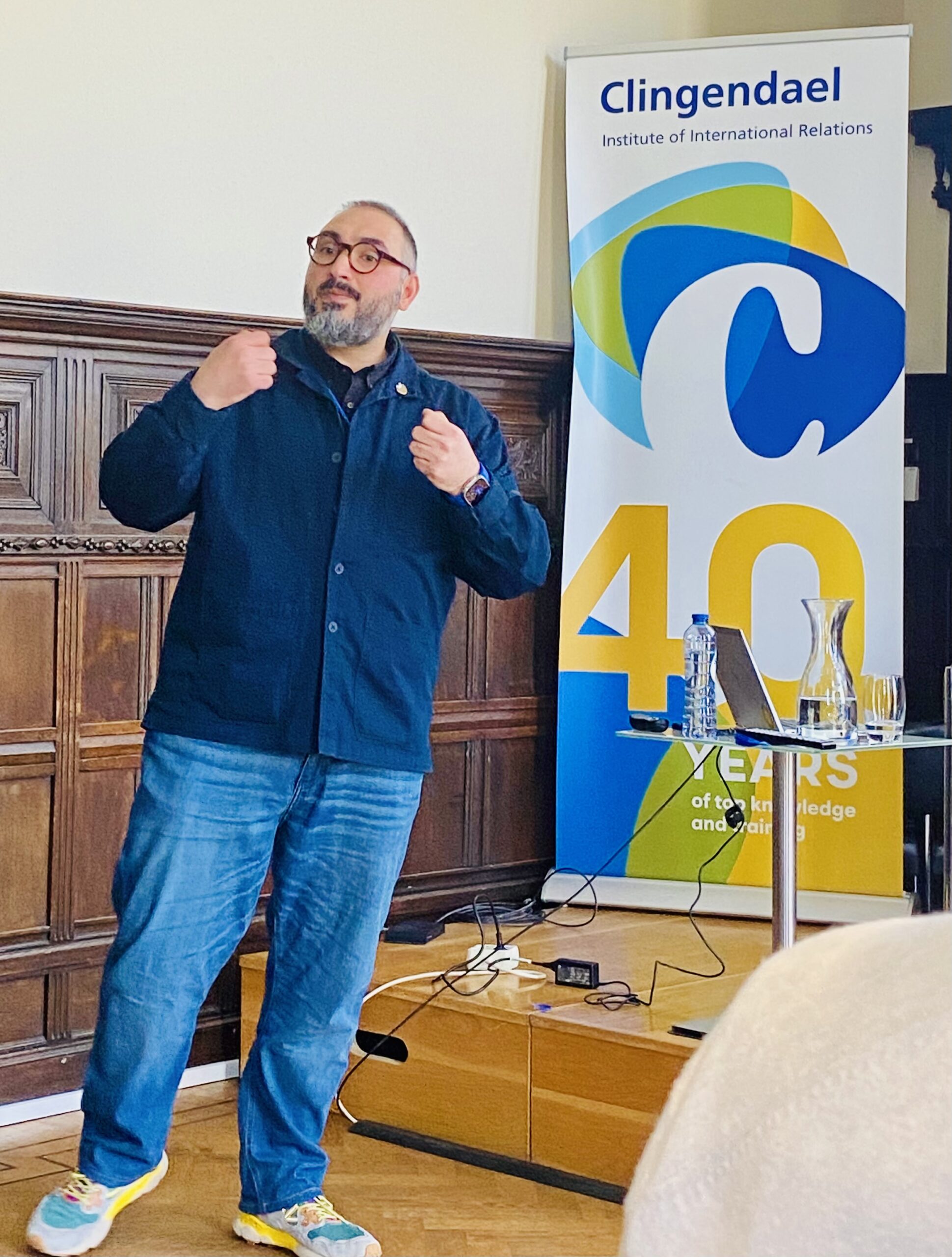
The second presentation in this session was given by dr Pieter Nanninga, an assistant professor at the University of Groningen who has worked on militant Islamist groups like al-Qaida and the Islamic State (IS) for years. Arguing along partly similar lines as the previous speaker, Nanninga stated that Islamic doctrine is of less importance than is often thought in the propaganda spread by IS. Focussing on the notions of honour and purity, he showed how IS tries to appeal to widely shared feelings among its base of supporters, rather than delving into theological or ideological details. This session, too, was followed by questions from the audience.
The final session of the day, chaired by Joas Wagemakers, consisted of a public lecture by Professor Maurits Berger, who is the Sultan of Oman Professor of Oriental Studies with a focus on Islam and the West. Berger gave a presentation on “The Relevance of ‘Soft’ Islamism”, in which he concentrated on aspects of Islam that get less attention in policy circles and the media, namely feminist Islam, Islamic economy, green Islam and the notion of an Islamic state. He pointed out that looking at religions – including Islam – is very useful and rewarding for policy makers and that we ignore them at our peril. Berger discussed the influence of Muslim feminists on legislation, Islamic faith-based organisations and the enormous amounts of money spent through them, the growth of Islam-based sustainability initiatives and the huge diversity of views on what an Islamic state looks like.
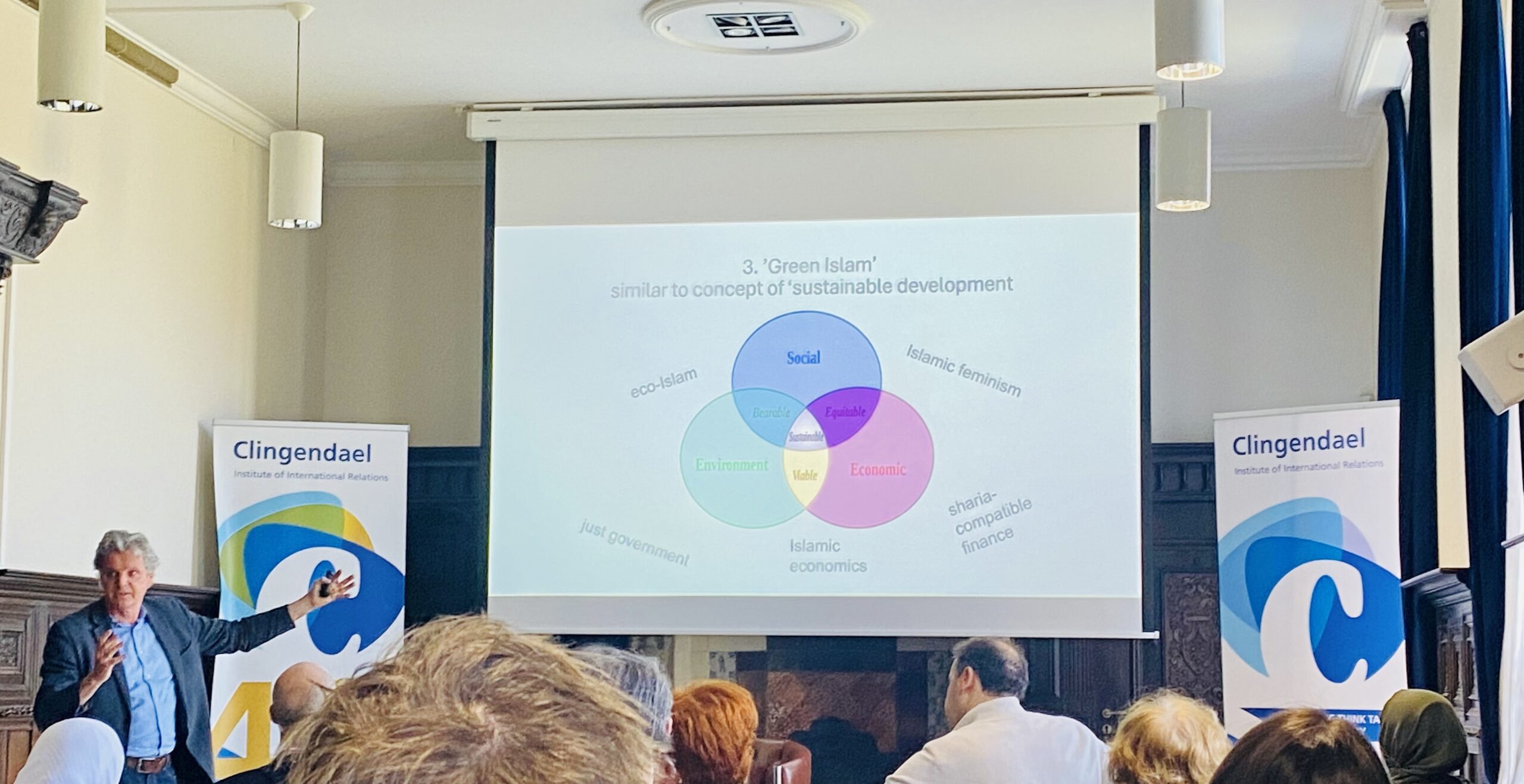
It was interesting to see how several lines of inquiry merged at the end of the day, showing the coherence of the different presentations and how well they related to each other. The end result was an interesting, stimulating and lively day that was informative to scholars and policy makers as well as to junior academics and their more seasoned counterparts. It was also a showcase of how academic researchers and more policy-oriented analysts can collaborate around a topic of mutual interest. All in all, we can look back on a successful workshop and a stimulating and rewarding partnership between NISIS and the Clingendael Institute.
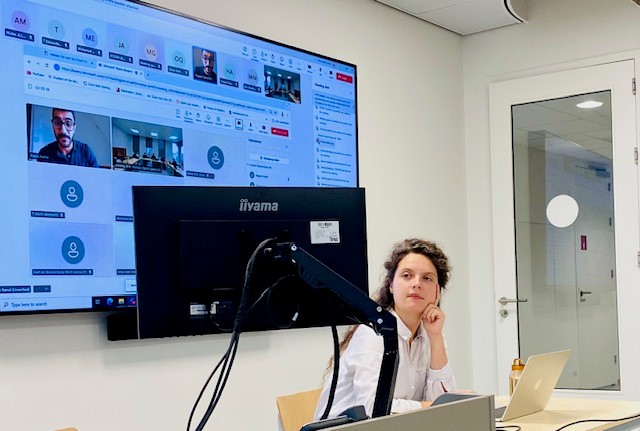
The NISIS Autumn School 2024 – Leiden University
This Autumn School focussed on the theme “Shiism and Sectarian Identities in Pre-Modern and Modern Islam”. Given Leiden University’s extensive expertise on this subject, the event was organised there this year on 29-30 November. On Tuesday 29 November, Dr Nathal Dessing (Leiden University) welcomed us all to Leiden and Dr Joas Wagemakers, the academic director of NISIS, subsequently opened the Autumn School and explained the purposes of NISIS and the goals of the Autumn School itself.
The first keynote speaker of the first day was Dr Kate Pukhovaia (Leiden/Utrecht University), who spoke on “Shi‘i State-Building: The Isma‘ili and Zaydi Political Projects”. During her presentation, she dealt with Zaydi and Isma‘ili political theory and the sometimes very different challenges these two Shi‘i trends faced. Specifically, she dealt with three case studies, namely the Zaydi imamate in Yemen, the Fatimid empire in North Africa and Egypt and the Nizari state in Iran, and how ideas on Shi‘i state-building played out in these contexts. This keynote lecture was followed by the two presentations by PhD-candidates, the first by Ragab Kamal (Philipps-Universität Marburg) on “The Dawoodi Bohra Community in Egypt and Their Role in the Development of Mosques, Especially the Mosques of the Ahl al-Bayt”; the second was by Hosein Azarniya (Islamic Azad University), who spoke about “Shared Concepts of Imamate in Twelver Shi‘ism and Sunnism: A Comparative Study from Qur’anic Interpretation to Political Authority”.
After a nice lunch, we gathered for a new session started by Professor Joseph Alagha (Haigazian University), who joined us online and gave a keynote lecture entitled “Jihad al-Tabyin in Performance Activism in the MENA”. In his lecture, he delved into different Islamic scholarly views and activist uses of jihad in various forms of performance, focussing on both Sunnis and Shi‘is, and how the concept of jihad al-tabyin has been employed to stimulate an Islamically sound discourse on performance, activism and humour. Professor Alagha’s lecture was followed by two presentations by PhD-candidates, the first of which was “Grief Traces in Desi-Dutch Shi‘ism: Towards the Communal Body”, presented by Aleeha Zahra Ali (Vrije Universiteit Amsterdam), while the second focussed on “Examining a New Framework of Sunni-Shi‘i Engagement in the Muslim World Amidst the Tension Iran-Israel”, presented by Syamsul Haq (Indonesian International Islamic University).
The third session of the day was kicked off by keynote speaker Dr Ahab Bdaiwi, who spoke on “Reassessing Early Islam: The Worldviews of Imams Muhammad al-Baqir (d. 732) and Ja‘far al-Sadiq (d. 765)”. His presentation started with methodological reflections on the relative lack of attention paid to Shi‘i Islam in Islamic Studies and how Western scholars’ own worldview often influences their work without openly acknowledging this. In fact, Dr Bdaiwi stated, these scholars often do this under the guise of objectivity, while actually affected by a conscious or unconscious worldview. He linked this to the worldviews of imams Muhammad al-Baqir and Ja‘far al-Sadiq, whose worldviews are acknowledged by several Shi‘i scholars. This session was ended by Victor Estévez Villanueva (Complutense University of Madrid), who presented a paper on “The Shi‘a Communities in Madrid: Dynamics of a Minority within a Minority”. This concluded the programme for this day, after which we enjoyed a dinner together at Hotspot Central in Leiden.
The second day of the Autumn School, Wednesday 30 October, started with an excursion to the Textile Research Centre in Leiden. Christina de Korte, a student of Religious Studies at Utrecht University, led us around the Centre, showing us all kinds of textiles from various parts of the world, including Muslim-majority countries. This was preceded by a very interesting talk by Dr Gillian Vogelsang-Eastwood, the director of the Centre, on the historical and cultural background of many textiles.
After lunch, we started the afternoon section of the day with a lecture by Dr Liana Saif (University of Amsterdam), who spoke on “Medieval Shi‘i Antinomianism and Esoteric Elusiveness”. In her presentation, Dr Saif examined how the notion of antinomianism was influenced by the spectrum of esoteric-exoteric ideas and the dichotomy between Islamic law and the divine truth and how the concept moved between the polemics of making things permissible (ibaha) and esoteric interpretation (ta’wil). This lecture was followed by Seyyed Pedram Rasouli’s (Tarbiat Modarres) presentation on the “Reflection of Twelver Sunni Beliefs in the Works of Attar of Nishapur”. The final student presentation of the day was by Amir Mohammad Emami (University of Exeter), entitled “‘He’s a Takfiki’: Maktbat-i Tafkik (the School of Separation) and the Formation of a Shi‘i Identity”.
The final session of the day consisted of a keynote lecture by Dr Yusuf Ünal (Utrecht University), “Shi‘i Identity in Pre-Modern Islamic History”, which focussed on the evolvement of the identity of Twelver Shi‘is. Dr Ünal paid specific attention to discourses on and the implications of conversion to Twelver Shi‘ism and the extensive range of Sunni labels used for Shi‘is of various types, based on their distance from and hostility towards Sunnism. After a brief discussion about this presentation, the NISIS director concluded the Autumn School, expressing the hope that we can meet again to further discuss the issues mentioned during this event at a later stage. We can look back on an interesting and stimulating event that truly allowed us to engage in in-depth discussions on Shi‘ism and sectarian identities in pre-modern and modern Islam.
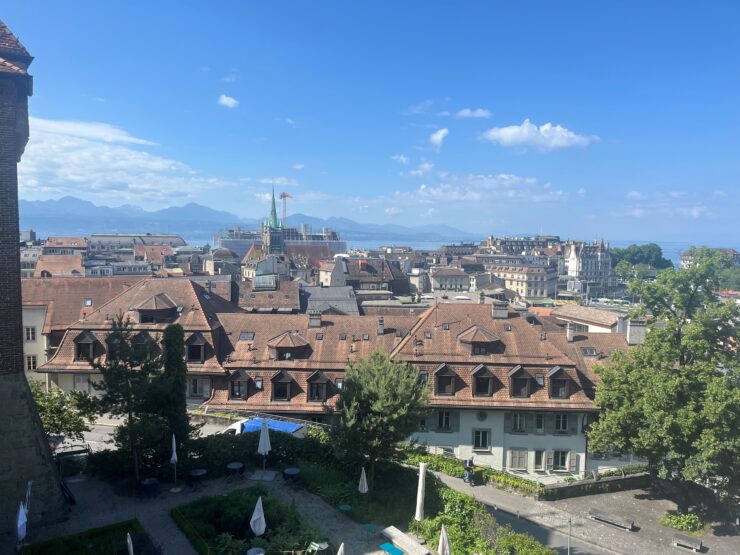 ENIS Spring School ’24 – Lausanne
ENIS Spring School ’24 – Lausanne
Just like every year, NISIS organised a Spring School in collaboration with its European partners of the European Network for Islamic Studies (ENIS) this year. The 2024 edition of the ENIS Spring School, themed “Peripheral Islam: Muslims on the Geographical, Normative, Political and Religious Margins”, took place at the University of Lausanne in Switzerland, from 4-7 June. Co-organised by ENIS representatives from the University of Lausanne, CNRS (Paris), the University of Catania, CSIC (Madrid), Philipps-University of Marburg, the University of Messina, the University of Erfurt and, of course, NISIS, this Spring School included some two dozen speakers presenting on a wide range of topics.
On Tuesday 4 June, after the opening of the Spring School by NISIS director Joas Wagemakers, Wissam Halawi (University of Lausanne) kicked off the proceedings with his keynote lecture on “Prohibiting Mixed Marriages in Druze Law”, which focussed on how this “peripheral” community dealt with marital relations between members of this group and those outside it and how legal scholars have treated this in their writings. This was followed by a session on “Peripheral Islamic Thought”, in which three PhD-candidates explored various aspects of this topic.
After a nice lunch in the university cafeteria, we moved on to the second keynote lecture by Sylvie Taussig (CNRS, Paris), which focussed on “Muslims in Latin America: Islam Without Theology?” and dealt with the various Muslim communities in South America that have come into existence there. The PhD-candidates in the sessions that followed concentrated on similarly “peripheral” regions where Muslims live under the heading of “Peripheral Muslim Communities” or on the presence of Shiite communities in Sunni contexts and their religious discussions with those surrounding them. We ended the first day with a very nice Swiss cheese fondue at a nearby restaurant.
On Wednesday 5 June, we abandoned our academic activities for a while and spent the day visiting parts of Lausanne’s city centre. We explored the city in two different groups, each led by an expert local guide (and, in one group, aided by Andrew Sutherland’s intimate knowledge of the city). Part of our tour included a visit to the wonderful cathedral of Lausanne, which was quite impressive. After a tasty Italian lunch, the more adventurous members of our group joined Andrew (Lausanne) for a hike around Lake Geneva and some even went for a refreshing swim there.
The third day of the Spring School, Thursday 6 June, started with a very wide-ranging keynote lecture by Gary Bunt (University of Wales Trinity Saint David) on “Digital Connections” in Muslim communities, which had relevance for various PhD-candidates working on different forms of periphery in Muslim contexts. Some of these presented their work in the next session, which focussed on “Contemporary Islamic Peripheral Thought”. This was followed by the second keynote lecture of that day, by Mònica Colominas Aparicio (University of Groningen), who spoke about “Mudejars and Moriscos in Christian Iberia: A Pre-Modern Muslim Periphery”, and a session of presentations by PhD-candidates on “Peripheral Views and Lifestyles” among Muslim communities. We ended the day with another wonderful dinner, this time in Italian style.
The final day of the Spring School, Friday 7 June, started with a keynote lecture by Thijl Sunier (Vrije Universiteit Amsterdam), who spoke about “Peripheries in the Making of Islamic Authority Among Muslims in Europe”, based on his latest book. This wide-ranging talk about Muslim communities in various European countries provided a very good introduction to the final session of the day (and the Spring School), which concentrated on “The West as Islamic Periphery”, during which several PhD-candidates presented their research about Western (influence on) Muslim communities.
At the end of the final day, we evaluated the Spring School and honoured Thijl Sunier, who will retire from his position as chairman of the board of NISIS at the end of this academic year. We thanked him for his service to both NISIS and ENIS and presented him with several gifts to express our appreciation for what he has done throughout the years. Likewise, I would like to thank Wissam Halawi for hosting us in Lausanne, as well as Pascal Buresi, Mirella Cassarino, Maribel Fierro, Albrecht Fuess, Daniela Melfa, Christoph Günther, Thijl Sunier, Araceli González Vázquez, Andrew Sutherland and Sara Muller for co-organising this ENIS Spring School. We can look back on a fascinating, interesting and rewarding experience.
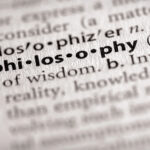
12 April 2024: NISIS Study Day “Islamic Philosophy?”
On Friday 12 April, the Netherlands Interuniversity School of Islamic Studies (NISIS) organised a seminar on Islamic philosophy at and in collaboration with Radboud University, Nijmegen. It started with introductions by Professor Carla Rita Palmerino, the director of research and head of the department of the History of Philosophy (both at the Faculty of Philosophy, Theology and Religious Studies at Radboud University), and Dr Joas Wagemakers, director of NISIS.
The seminar continued with a session on classical Islamic philosophy. The first speaker, Professor Cornelia Schöck (Ruhr-Universität Bochum), presented her work on how Muslim theologians have adopted and transformed Aristotelian philosophy. Although this was a highly theoretical presentation, Professor Schöck was nevertheless able to make it intelligible to a broader audience. This was followed by Dr Andreas Lammer’s (Radboud University) presentation on Avicenna and al-Ghazali. By making use of the example of a Las Vegas magic trick, he showed that Avicenna and al-Ghazali are not as fixed in their stereotypical images as, respectively, the pure philosopher and the anti-rational Muslim scholar, but actually had more in common than is often believed.
After lunch, the second session dealt with pre-modern Islamic philosophy. It featured Professor Peter Adamson (Ludwig-Maximilians-Universität München), whose presentation focussed on the scholar al-Biruni (d. ca. 1048) and the way the latter has drawn on Greek and Indian philosophy and the distinction between “elite” and “common” beliefs. This was followed by Dr Ahab Bdaiwi’s (Leiden University) presentation on the role of philosophy among the first six Shiite Imams in their worldview. The latter was contextualised in a broader attempt to redirect the focus away from Sunnism and towards the relevance of philosophy in Shiism.
The third session of this seminar concentrated on modern Islamic philosophy. The two speakers of this session, Dr Harald Viersen (Radboud University) and Professor Kata Moser (Georg-August-Universität Göttingen) took turns presenting their work. Viersen spoke on Mustafa ‘Abd al-Raziq, ‘Ali Sami al-Nashshar and the post-Orientalist study of Islamic philosophy in twentieth-century Egypt. Contextualising these two thinkers by delving into factors such as colonialism and the Nahda (renaissance) of Arab literature, language and culture, he dealt with notions such as heritage, authenticity and modernity. Moser, for her part, concentrated on the Christian philosopher Nasif Nassar and the importance of secularism in his thought (and that of his predecessors) and what role it plays in his philosophical views on justice. By doing so, both speakers also touched upon the question – dealt with implicitly and explicitly by all speakers at this seminar – of what makes Islamic philosophy Islamic and philosophical.
The fourth and final session of this seminar was a public lecture, specifically taking a broader and less specific approach to the topic of Islamic philosophy. As such, Professor Carool Kersten (Catholic University Leuven) presented his work on philosophies of religion in the contemporary Muslim world. First concentrating on the right word to use to denote philosophy in Arabic (ultimately settling on fikr (thought)), he subsequently focussed on the work by the Indian philosopher Muhammad Iqbal and his influence on other contemporary thinkers, including the Egyptian Hasan Hanafi, the Moroccan Muhammad ‘Abid al-Jabiri and the Iranian Abdolkarim Soroush. Taking a global approach, Kersten brought the discussion full circle by returning to the use of terminology again.
NISIS would like to thank all speakers, who helped make this an interesting and fascinating seminar, as well as Radboud University in Nijmegen, which welcomed us and treated us to a very nice lunch. We would specifically like to thank Professor Karin van Nieuwkerk (Radboud University), Dr Andreas Lammer and Dr Harald Viersen for helping us to make this seminar a reality. Their input on the content of the seminar and their help in organising it were essential in ensuring its success. We look forward to working with them and perhaps seeing the readers of this report at a future NISIS event.
Autumn School 2023: ‘The Qur’an and Its Interpretive Communities’
This year, the NISIS Autumn School, themed “The Qur’an and Its Interpretive Communities”, was organized at the Vrije Universiteit (VU) in Amsterdam on 23-26 October. The theme of the event was, on the one hand, intended to engage with research about scholarly Qur’anic exegesis and hermeneutics conducted at the VU, while it also consciously sought to connect this with how different lay Muslim communities interpret the Qur’an. The speakers, as such, represented a wide variety of approaches to the study of the Qur’an, providing participants with a broad and multidisciplinary event.
On Monday 23 October, the Autumn School was opened by Professor Gregor Halff, the dean of the Faculty of Social Sciences at the VU, and introduced by dr. Joas Wagemakers, the academic director of NISIS, followed by the first keynote speaker, dr. Yusuf Çelik (VU). The latter spoke on “From Producing Interpretations to Reflecting on the Matter of Interpretation Itself: The State of Qur’anic Hermeneutics in Turkey”, which dealt with three specific Turkish scholars working on the hermeneutics of the Qur’an. He showed that these scholars differ from one another in their approaches to Scripture, which are sometimes so controversial that they have had to retreat from some of their own conclusions. This was followed by the first group of participants, which included Murat Kayalık, who spoke about the ninth-century Sufi scholar Sahl al-Tustari and his interpretation of parts of the Qur’an, and Maria Wozniak, whose presentation dealt with Polish translations of the Qur’an from the sixteenth to the twenty-first century.
The second session was kicked off by Professor Johanna Pink (University of Freiburg) with a presentation on “Exegetical Genealogies: Qur’an Translation and the Faces of Muslims Scholarship in the Twentieth and Twenty-First Centuries”, which focussed on the role of Muslim scholarship and to what extent the authors of works on the Qur’an can be seen as scholars as well as the fine line between translation and exegesis of the Qur’an. The PhD-candidates participating in this session were, in order of appearance, Elvira Kulieva, whose presentation dealt with the Qur’anic mission of the Ahmadiyya in Russia through its Russian translation of the Qur’an, Majid Rashidian, who presented Qur’anic interpretations in Iran and in Persian, and Necmettin Salih Ekiz, discussing the reception of Ignaz Goldziher’s Die Richtungen der islamischen Koranauslegung among Turkish exegetes.
The second day of the Autumn School – 24 October – started with a keynote lecture by dr. Marijn van Putten (Leiden University) on “The Origins of the Qur’an in Light of a Primary Source Revolution”, in which he first presented the traditional Islamic narrative on the development of the Qur’an, followed by academic approaches to the same question. The latter include his own and his conclusion traces the origins of the Islamic holy book quite close to that of the traditional narrative. The PhD-candidates following this lecture were Azhari Andi, who spoke on the story of the sacrifice of Abraham’s son in early Qur’an commentaries, Shahin Meysami Azad, whose presentation dealt with mathematical approaches to the Qur’an, and Mohammad Alamolhoda, who presented his findings on the most prominent theories about the Jewish or Christian origins of the Qur’an.
While the first half of the Autumn School focussed largely on scholarly discussions on the Qur’an and its exegesis – leading to interesting and lively discussions among those present – the second half of the event, starting on Wednesday 25 October, concentrated on how “ordinary” Muslim communities have dealt with the Qur’an. The first keynote lecture within this subtopic was “Laypersons as Exegetes? Possibilities and Limits of the Interpretative Engagements of ‘Ordinary’ Muslims with the Qur’an”, presented by dr. Fatima Çaviş. She showed examples of lay Muslims engaging with controversial passages from the Qur’an about gender relations and how they fit within a larger of context, both exegetically and in today’s society. This was followed by Mohammad Mahdi Fallah’s presentation on Shabestari’s phenomenological interpretation of the Qur’an from a non-dualistic perspective. Although these two presentations were quite different in nature, we were still able to connect the intellectual and philosophical approach of the latter with the focus on interpretive communities of the former by focussing on Shabestari’s views on human rights.
During the afternoon, dr. Carmen Becker (Leibniz Universität Hannover) concentrated on Salafi online practices and how “the religious” was expressed in her paper “‘Digital Religion’ and Muslim Interpretive Communities: A Social Theory Practice”. She discussed in what ways such practices could constitute online interpretive communities and how these can be analysed through social theory. Her talk was followed by Egi Tanadi Taufik, who spoke on the Ahmadiyya community in Indonesia and its use of Mary in their Qur’anic exegesis. This was followed by Irene Vincente López de Arenosa, whose presentation focussed on the role of talbes (Muslim students of Arabic and the Qur’an) in the teaching of Qur’anic sciences in seventeenth-century Morocco, concentrating on the case study of Abdalá Oropesa and Fray Pedro de Alcántara. Finally, Seyed Pedram Rasouli presented his work on Moses’ Qur’anic narrative as an interpretation of specific verses.
The final day of the Autumn School focussed on teaching and monitoring the Qur’an and its interpretive communities. Dr. Welmoet Boender (VU) started this topic with her presentation “Understanding Islamic University Theologians at Western European Universities as an ‘Interpretive Community’: Possibilities and Limits”. She delved into how Qur’anic interpretation is at the core of contextual, critical-reflective theology at Islamic university programmes in Germany, the Netherlands, Great Britain and Austria. Boender showed that this theology reflects on how Muslims can deal with both interconfessional and intrareligious plurality. This was followed by Setareh Hongxin Zheng’s presentation on another Muslim community in Europe, namely Shiite in Brussels, and how rituals and memories influence their Qur’anic translations and teachings. Finally in this session, Yulianingsih Riswan continued the focus on Muslims in Europe through her presentation on intergenerational engagement with the Qur’an and how teaching this book has been transformed among Indonesian Muslims in the Netherlands.
Continuing the theme of the Qur’an among Muslims in Europe, Luis Manuel Hernández Aguilar (Europa-Universität Viadrina Frankfurt (Oder)) presented “Reading the Qur’an in Racial Times”. In his presentation, he conveyed the message that thinking about the Qur’an today necessitates that we understand the Islamophobia and racism towards Muslims in societies today. His presentation was followed by that of Saadatul Jannah, who discussed the influence of eschatological interpretation on the work the Mu‘tazili exegete al-Zamakhshari. Following this, Annas Rolli Muchlisin presented his work on the enduring importance of Tafsir al-Jalalayn and its Hashiya al-Sawi in Indonesian Islamic intellectual history.
Throughout the Autumn School, a wide variety of speakers was given the chance to present their work, which was often followed by lively – and interdisciplinary – discussions. New contacts were made and new insights were gained. Perhaps most important, however, was the interplay between a very diverse set of academics. One of the goals of this event was to seek scholarly interaction between scholars of the Qur’an and of Qur’anic exegesis, on the one hand, and academics working on various interpretive communities on the other, as the title of this Autumn School suggests. Both the keynote speakers and the participants engaged in this and ensured that we realised this goal, thereby also showing that the way Muslims deal with the Qur’an continues to be not only a fascinating, but also a highly dynamic process.
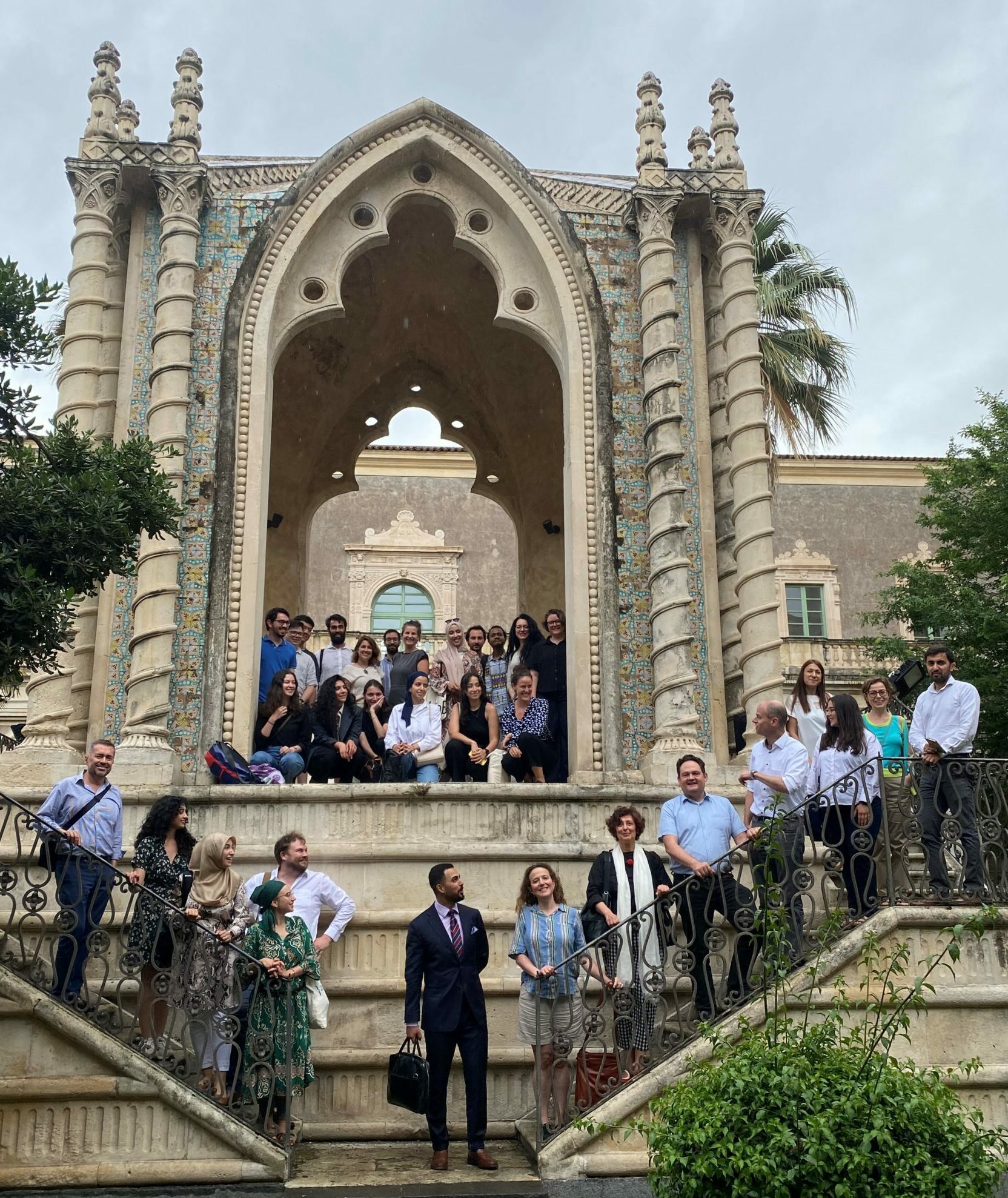
ENIS Spring School Catania 2023 ‘Shifting Boundaries in Muslim Worlds’
From 13 until 16 June 2023, NISIS was involved in the annual European Network for Islamic Studies (ENIS) Spring School, themed “Shifting Boundaries in Muslim Worlds” and convened in Catania, Italy. Together with our European partner organisations – the Institut d’études de l’Islam et des sociétés du monde musulman (IISMM, France), the Center for Near and Middle Eastern Studies (CNMS, University of Marburg, Germany) and El Consejo Superior de Investigaciones Científicas (CSIC, Spain) – we gathered at the University of Catania, where we enjoyed keynote lectures, papers presented by PhD-candidates from various European countries (and beyond) and the wonderful city of Catania and the island of Sicily as well.
After warm words of welcome from our hosts, rector Francesco Priolo, director of the Department of Humanities Marina Paino and Mirella Casarino (all from the University of Catania) and Daniela Melfa (University of Messina, formerly of the University of Catania), the first day was kicked off by Roberto Tottoli (University of Naples), who spoke about “Holy Books Across Borders: The Qur’an between the Islamic World and the West”. This was followed by Linda Jones (Univerity of Pompeu Fabra, Barcelona), who discussed “Shifting Gender Boundaries in the Study of Premodern Sufi Piety”. The rest of the day was dedicated to papers presented by PhD-candidates on a host of issues, all revolving around the common theme of shifting boundaries in Muslim worlds. We closed the day with a great dinner that allowed the participants to get to know each other better.
The latter objective was also central to the second day of the Spring School, 14 June, which we spent going on an excursion to various places in Sicily. After a nice bus ride through the Sicilian countryside, we visited some beautiful churches and a university library, had a wonderful lunch and closed the day with a visit to a local chocolate factory where we watched a demonstration of how chocolate is made. It goes without saying that the offer to sample some of the latter’s produce was gladly made use of by everyone present.
The third day, 15 June, was filled with paper presentations by participants and two keynote lectures. The first was given by Mirella Casarino, focussing on Islamic texts from Sicily itself in “Beyond Boundaries in Islamic Sicily: Literary Texts and Case Studies”. The second keynote lecture of the day was given by Mehdi Sajid (Utrecht University), who spoke about his on-going project on the history of Islam in Morocco: “Inventing a Modern ‘Arab-Muslim’ Nation: Some Remarks on Morocco’s Nation-Building process (1800s-present)”. Afterwards, we were treated to a tour of the university building in which the Spring School took place, which actually used to be a large and rather impressive monastery.
Friday 16 June, the final day of this Spring School, began with a keynote lecture on sectarianism by Fanar Haddad (University of Copenhagen), “The non-sectarian boundaries of modern sectarian identities”. This was followed by more papers by participants and a nice lunch at the end.
We can all look back on a successful, interesting and convivial Spring School in which we not only gained insights into a host of fascinating topics, but during which PhD-candidates were also given plenty of opportunities to discuss their work and interact with senior scholars in their field. Last but not least, there was plenty of time for participants to extend their network among their future colleagues. I am happy to say that everyone seemed to make great use of this possibility.
The NISIS team would like to thank our hosts in Catania, the keynote speakers, all participants, panel chairs and our ENIS partners who helped make this Spring School possible, including Pascal Buresi (CNRS, EHESS, CIHAM), Sophie Bilardello (CNRS, IISMM), Emmanuelle Gravejat (EHESS, IISMM), Maribel Fierro (CSIC, Madrid), Albrecht Fuess (CNMS/Philipps-University of Marburg) and Thijl Sunier (VU Amsterdam). We look forward to future opportunities to cooperate.
UCSIA and NISIS conference “Islam and the State”
On Friday 12 May 2023, the University Centre Saint-Ignatius Antwerp (UCSIA) and the Netherlands Interuniversity School for Islamic Studies (NISIS) organized a one-day conference on the topic of “Islam and the State” at the University of Antwerp. The day was opened by Barbara Segaert (project coordinator at UCSIA) and Joas Wagemakers (academic director at NISIS) and started with a session on Islam and the state in Lebanon. This session, which was moderated by Joas Wagemakers, included presentations by Ward Vloeberghs (senior lecturer in political science, Erasmus University Rotterdam), who spoke about Sunni Islamic “sectarian entrepreneurs” and how they have played a role in negotiating an identity in post-war Lebanon, and Roschanack Shaery-Yazdi (associate professor of history, University of Antwerp), who analyzed the politicization of the Shiite community in Lebanon since the 1960s, with a focus on Hizbullah since the 1980s.
After a nice lunch, the day continued with its second session, which focused on Morocco and was also moderated by Joas Wagemakers. The first speaker, Sami Zemni (professor of political and social science, Ghent University), discussed the historical role Islam has played in the legitimization of authority in Morocco and how the state has sought to create an “official Islam”. The second speaker in this session, Nina ter Laan (postdoctoral researcher, University of Cologne), built on this theme by concentrating on the aesthetic practices the Moroccan state employs to express this “Moroccan Islam”, particularly through the promotion of Sufism and the heritagization of the country’s Jewish history.
The third and final session of the day, moderated by Leni Franken (educational supervisor, University of Antwerp), was aimed at a broader audience and therefore conducted in Dutch. Its first speaker, Nadia Fadil (associate professor of social and cultural anthropology, Catholic University Leuven), spoke about the idea of a Belgian Islam, which she presented as ascribing too much coherence to both the Belgian state and Islam in Belgium. The second speaker of this session, Martijn de Koning (associate professor of Islam, politics and society, Radboud University Nijmegen), analyzed Islamophobia in the Netherlands and how the Dutch government’s policies have affected this phenomenon.
Although there were some unfortunate problems in Dutch public transport on 12 May, forcing several students and PhD-candidates to cancel their participation, we nevertheless look back on an interesting day and a successful cooperation between our two organizations. We thank our UCSIA partners in Antwerp, Barbara Segaert and Gilke Gunst (who were also responsible for the photographs), and look forward to collaborating again in the future.
Henriëtte van Lynden lecture:
‘A Decade after the Spring – The Arab World at Crossroads’
held by Amr Hamzawy on 15 December 2022
You can watch the recording of the lecture here.
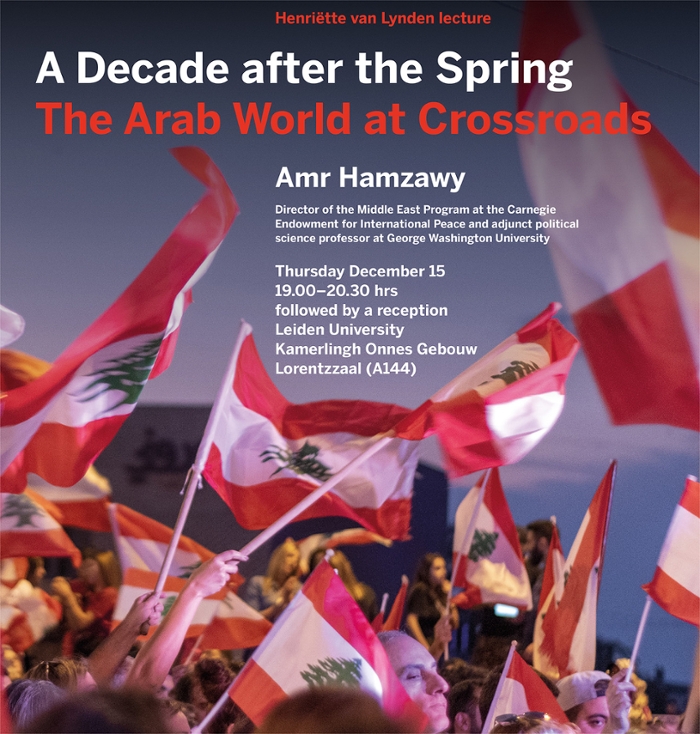
Workshop ‘Political Mobilization and Democratic Breakthroughs’ – 14 December 2022
This workshop, held by Dr. Amr Hamzawy, was organised in close collaboration with Leiden University and the Dutch Ministry of Foreign Affairs.
Mass politicisation mobilisation occurs in both democracies and autocracies. Sometimes political protests, demonstrations and acts of non-violent civic resistance undermine autocracies, produce democratic breakthroughs, or generate democratic reforms. Other times, they do not. This workshop explored, with a focus on the Middle East and North Africa (MENA), why, first examining the original causes of mobilization, some movements succeed and others fail.
The first session of the workshop reviewed theories of revolution, social movements, and democratization. The second session will dive into MENA case studies.
About the Speaker
Amr Hamzawy is the director of the Middle East Programme at the Carnegie Endowment for International Peace in Washington, DC. He studied political science and developmental studies in Cairo, The Hague, and Berlin. In the coming years, Amr Hamzawy will also teach at George Washington University in Washington DC. He was previously an associate professor of political science at Cairo University and a professor of public policy at the American University in Cairo. Hamzawy’s research, teaching interests as well as academic publications focus on democratisation processes in Egypt, governance in the Arab world, and contemporary debates in Arab political thought. His recent book ‘Struggles for Political Change in the Arab World’ was published in October 2022.
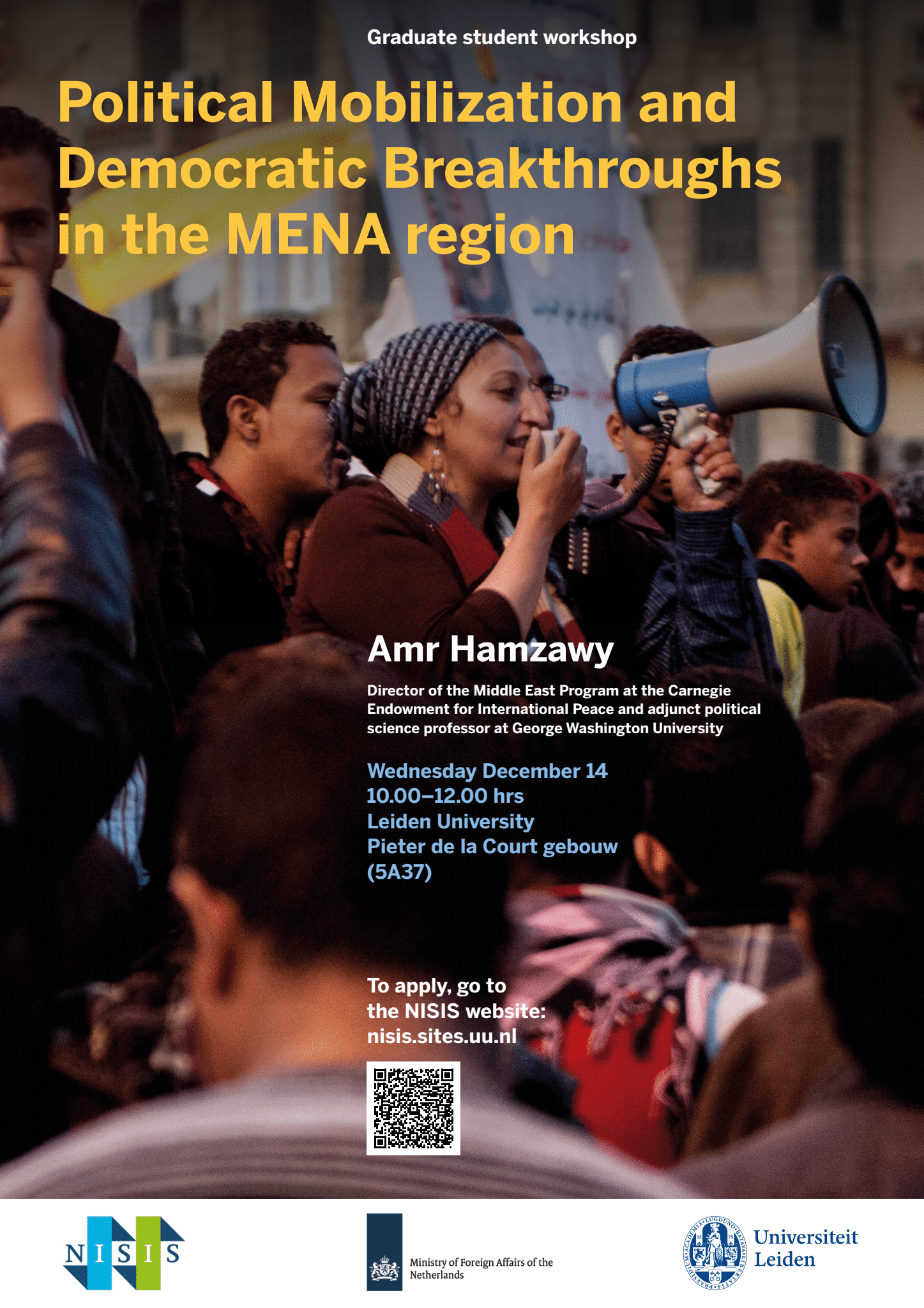
A look back at the Autumn School in Bonn
by PhD-students Laura Emunds and Nynke van Leeuwen
The Autumn School on Coercion, Slavery, and Relations of Dependency in the Islamicate World took place in Bonn (Germany) at the Bonn Center for Dependency and Slavery Studies (BCDSS) on 2-4 November 2022.The event was co-organised by the BCDSS and NISIS, the Netherlands Interuniversity School for Islamic Studies.
Thematically, the Autumn School tackled questions of coerced labour, slavery, and other forms of strong asymmetrical dependencies in historical and contemporary perspectives with a focus on Islamicate societies. Despite the fact that this might be considered a rather broadly outlined topic, already the opening keynote lecture given by one of the leading experts when it comes to the study of slavery in the Islamicate world, Prof. Dr. Ehud Toledano (University of Tel Aviv, Israel), showed the importance of comparative and global perspectives for this field.
The main goal of this event, however, was clearly to bring together and encourage discussions between young researchers working within their PhD-projects on various aspects related to the subject focus outlined above. In this regard, the organisers compiled a carefully selected range of thematic, theoretical, as well as methodological approaches to the topic: the talks given by the PhD-candidates focused on aspects of legal theory and practice, on experiences of enslaved and imprisoned people, on questions of class struggle and art production as well as on matters of coerced labour and the role of Orientalists who obtained knowledge with the help of unfree teachers.
Besides this, the participants were also encouraged to take part in four seminars in which further debates emerged naturally due to the more interactive format. The first seminar given by Assoc. Prof. Dr. Serena Tolino (University of Bern, Switzerland) was centred on eunuchs and questions located at the intersection of dependency, power, and gender. The second seminar was organized by the political analyst Dr. Sebastian Sons (CARPO, Germany) and allowed the students to learn more about relations of labour exploitation in the Arab Gulf States today. Conducted by Prof. Dr. Stephan Conermann (BCDSS), the third seminar was designed to introduce the PhD-candidates to the development and the theoretical framework of the Cluster of Excellence that stands behind the BCDSS. Here, the participants discussed in particular the difficulties, but also the merits of uncovering and defining common elements in an interdisciplinary research environment. The final seminar, which was given by Assoc. Prof. Dr. Paolo Gaibazzi (University of Bayreuth, Germany & University of Bologna, Italy), drew the participants’ attention to questions of “post-slavery mobilities” and the highly important role of (im-)mobility for people affected by slavery, coercion, and other forms of “strong asymmetrical dependencies”.
In summary, the Autumn School provided young researchers with a highly valuable and welcoming environment to not only present their own work and projects and receive useful feedback, but also to get into conversation with fellow PhD-candidates and experienced senior researchers in the field, in order to expand their own networks.
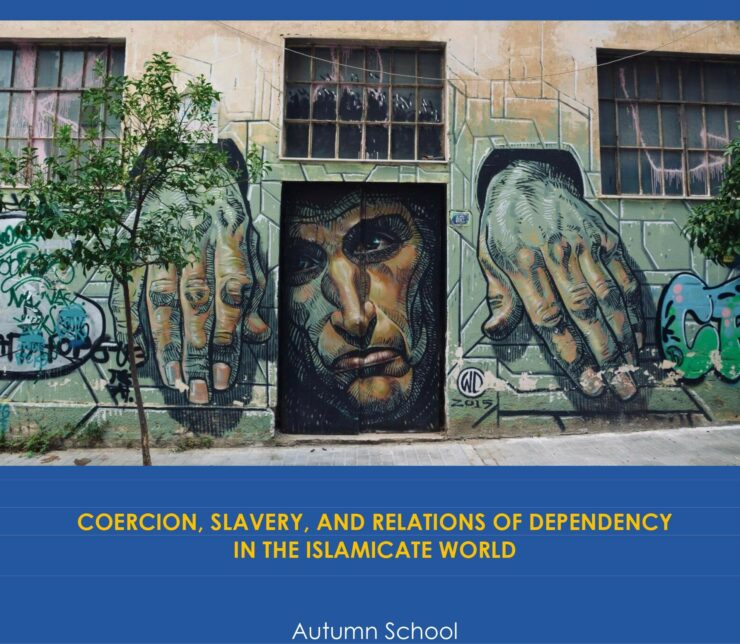
Film screening ‘Somos Musulmanes’
On Friday evening 7 October 2022, NISIS invited filmmaker Dhia Ben Naser for the screening of the beautiful and surprising documentary ‘Somos Musulmanes’ (subtitled in English) at Pakhuis de Zwijger.
In the misty mountains of San Cristobal de Las Casas, Mexico, sheltered under improvised houses, lives a small Muslim community of Tzotzils, an ethnic group of Mayan descent. But what is their story? In the midst of the Zapatista Revolution, a movement that fought for the emancipation of indigenous peoples, a group of Sufi Muslims traveled from the Iberian Peninsula to Mexico, to the Chiapas region, with the idea that Islam would strengthen the revolutionary character of the movement. . Commander Marcos did not embrace this idea, but during their discussions several leaders of Tzotzil families converted to Islam, dramatically leaving Mexico’s dominant Hispanic-Christian tradition behind. In doing so, they changed the fate of their clan…
A documentary by Unexpected Muslims
After the screening there was a Q&A with one of the filmmakers of Unexpected Muslims, Dhia Ben Naser. The documentary ‘Somos Musulmanes’ is in Spanish with English subtitles. Duration: 1 hour and 5 minutes. Entrance: free.
Check out the trailer of Somos Musulmanes: https://www.youtube.com/watch?v=cGR7qhURqX8&ab_channel=UnexpectedMuslims
A look back at the ENIS/NISIS- MIDA Summer School at Sunan Kalijaga University Yogyakarta, “Mobility and mobilization in Muslim societies,” 20-24 June 2022
From June 20-24 this year, a group of 15 NISIS junior and senior members traveled to Yogyakarta, Indonesia, to attend the NISIS Summer School, co-organized by Sunan Kalijaga University and the EU-funded project “Mediating Islam in the Digital Age” (MIDA). Due to the pandemic, the event had been postponed not once but twice, which made it all the more special when it finally took place. It was a joyous week, with a rich programme of keynote and paper presentations and full of good conversations with our hosts, including the many local students. The hospitality of Prof. Noorhaidi Hasan and his excellent staff touched us deeply. All those who were there will cherish many good memories of the proceedings on Sunan Kalijaga University’s beautiful campus, but also of the spectacular dinners and excursions that were organized collaterally.
The keynote lectures were provided by Claudia Derichs (Humboldt University Berlin), Edith Franke (Marburg University), Syafiq Hasyim (Indonesian International Islamic University, Jakarta), Istiqomah (State Institute of Islamic Studies, Ambon), David Kloos (Royal Netherlands Institute of Southeast Asian and Caribbean Studies, Leiden), Syamsul Rijal (State Islamic University of Syarif Hidayatullah, Jakarta), Sunarwoto (Sunan Kalijaga University, Yogyakarta), and Martin van Bruinessen (Utrecht University). The speakers reflected on the various levels in which mobility and mobilization in the Islamic world plays out, whether in terms of labor migration, traveling in search of Islamic knowledge (al-rihla fi talab al-‘ilm), rural-urban movements, especially that of women, the circulation of knowledge by digital means, or the role of traveling objects and material practices in the mobilization of Islamic ideas across space and time.
In the imagination of scholars of Islam, Muslims and non-Muslims alike, Indonesia has traditionally been placed at the “periphery” of the Islamic world. Indonesia’s long history of trade and knowledge relations with the rest of the Islamic world, and the two holy cities of Mecca and Medina in particular, added to the urgency and topicality of the Summer School. For us, the NISIS participants, it was fascinating to observe how the notion of Indonesian Islam’s “peripherality” is in fact contested in Indonesia. The many advocates of the notion of Nusantara Islam (Indonesian Islam) seek to divest Indonesian Muslims, their beliefs and practices, of the stigma of marginality, not only because demographically speaking, Indonesia is not the periphery, but rather the center of the Islamic world, but also, because the way in which Islam has developed on the Indonesian archipielago opens up new horizons for thinking about the future of Islam in the 21st century.
The lasting impression of this year’s Summer School, however, will be that of having (re)connected with the global scholarly community of Islamic Studies, beyond Covid and Zoom, and of having been the lucky guests of our wonderful Indonesian hosts. Terima kasih, accept love!
Christian Lange, 27 July 2022
NISIS Workshop Day ‘Islam & the media’ in collaboration with the NISIS Junior Council
20 May 2022, Utrecht University
On Friday the 20th of May, Research School NISIS organized a Workshop day about ‘Islam & the media’ for RMA and PhD students. After two plenary sessions, one with a keynote by dr. Martijn de Koning (Radboud University) and another Prof. Dr. Maurits Berger (Leiden University), there were two workshops, both zooming in on the topic ‘Islam & the media'(parallel workshops offered in English and Dutch).
Keynote lecture by prof. dr. Maurits Berger (Leiden University)
During this lecture, Maurits Berger discussed how academics can go out of their peer-review bubble to actively shape and participate in the discourse on Islam going on in the media. After his talk, there was be plenty of time for discussion.
Keynote lecture by dr. Martijn de Koning (RU)
“How will people see me?” – Dutch Muslims responding to the imagination of risk and Islam in Dutch policies and media and the construction of a regime of surveillance
O’Malley (2016: 86): “If it can be imagined, it must be governed.”
In this lecture Martijn de Koning explored the construction of the figure of The Muslim through policies and media and the responses by Dutch Muslims. After a brief discussion about representation and the racialization of Muslims, he presented three vignettes to highlight different ways in which Muslims are related to danger and being out of place. The first one highlighted the normalization of seeing the Muslim male body as a representation of a concrete danger, the second pertained the Muslim female body as a representation of unwillingness to become and the third showed the erasure of particular representations. Together, de Koning suggested, these vignettes show how Muslims are interpellated as on ontological risk for Dutch society. Based upon his informal conversations, interviews and observations he then outlined the different types of responses to these imaginations and argued that they construct a regime of surveillance among Muslims.
Workshops
Islam and the media – NL
What do you encounter when you are an editor at a newspaper, a radio program or a TV station when it comes to reporting about the Islam or Muslims? In this practical, insightful and fun workshop, led by Ewoud Butter, you could gain experience first hand (for Dutch speakers only).
Muslims and Jews in the Media – a comparative study dating back to the 1900s – EN
This workshop was led by Prof. Thijl Sunier (also Chairman of the NISIS board) and was inspired by a dissertation of Aalt Smienk, one of his PhD students, who compares the reporting about Jews in 1900 with the reporting about Muslims in 2000. This research has been conducted with a quantitative tool which made it possible to analyze large quantities of newspaper articles published around 1900 in precisely the same way as newspaper articles published around 2000. By doing so, the researcher was able to avoid the so-called ‘holocaust-bias’. Contemporary perceptions on the position of Jews in the late 19th century are strongly influenced by the murder on over 6 million Jews by the Nazi’s. In this way the emancipation process of the two communities could be juxtaposed to explore differences and similarities.
Writing clinic
Together with the other participants, you could discuss a chapter of your master thesis or dissertation, or another dissertation-related paper you have finished writing or are still working on. This writing clinic gave you the opportunity to receive in-depth feedback from senior researchers other than your PhD supervisor(s), as well as from master and PhD peers.
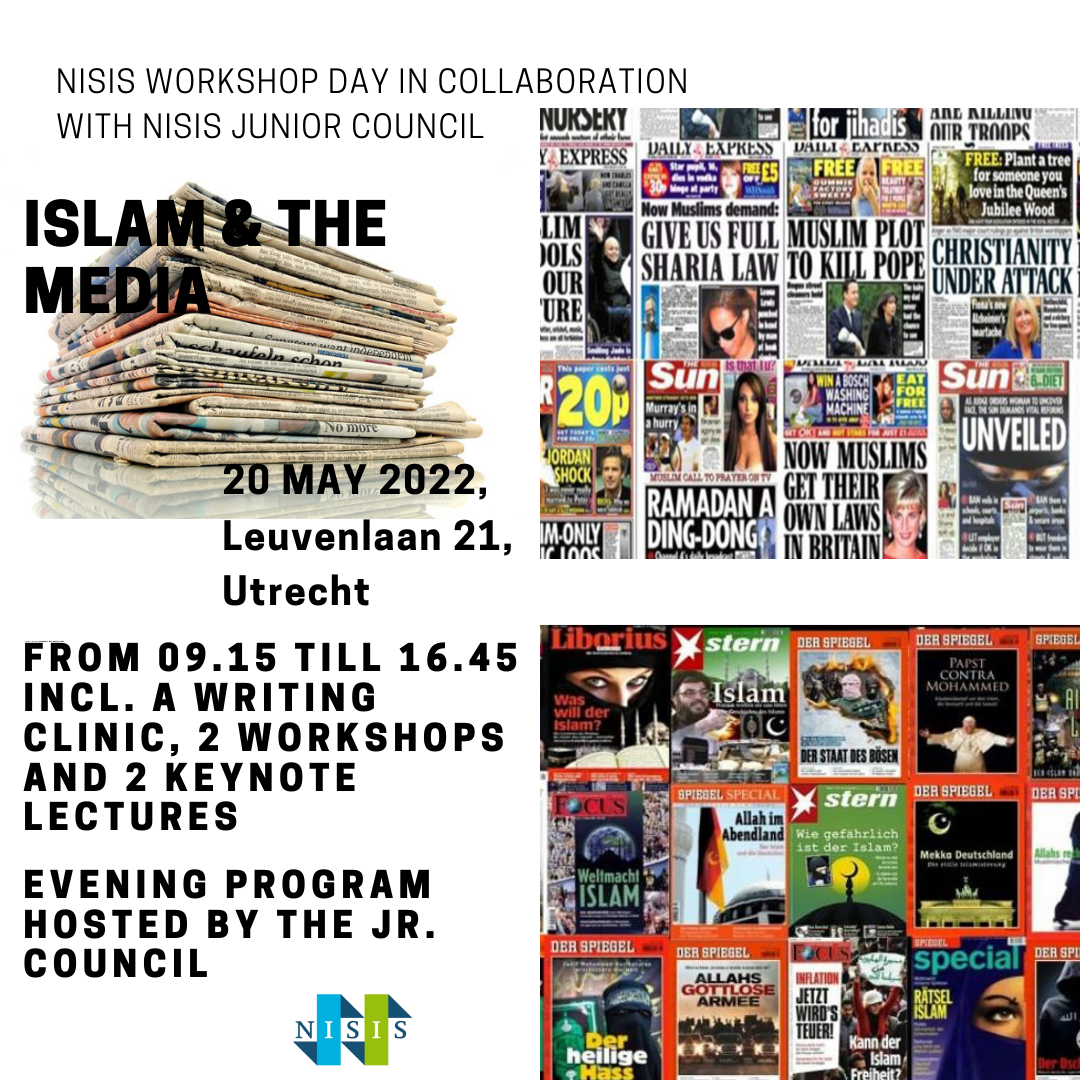
NISIS Autumn School: “Islamic(ate) Classics From Manuscript to the Digital Age”
8-12 November 2021, University of Leuven
In the fall of 2021 we all enjoyed some weeks with fewer restrictions. The Autumn School, which took place in Leuven from 8 to 12 November, was one of the events we were able to celebrate live – and what an inspiring and pleasant event it was!
Following up on Ahmed El Shamsy’s widely discussed recent book, Rediscovering the Islamic Classics: How Editors and Print Culture Transformed an Intellectual Tradition (2020), the Autumn School focused on the impact of technological changes on Islamic(ate) primary sources and scholarship not only in the transition from the manuscript to the printing age, but up until the current digital era as well. El Shamsy, a professor at the University of Chicago, opened the school on Monday with a lecture entitled “The availability of Arabic books, 1800 to the present”. Our view of the Arabic written textual heritage, as he pointed out, is skewed by the notion of “classics”: a lot more remains to be discovered!
The other keynote lectures, by Beatrice Gründler (Free University Berlin), Peter Verkinderen (KITAB project London) and Brinckley Messick (Columbia University New York), as well as a workshop on Digital Humanities led by Emad Mohamed (University of Wolverhampton), continued this theme, and the many excellent student and PhD presentations, including from young researchers joining us from Egypt and other parts of the Islamic world, contributed further aspects. As always, it was a pleasure to listen to the NISIS junior members present their ongoing research (on topics as diverse as Islamic theology, the history of Orientalism, Islamic bedtime stories, and Russian Islam, to name just a few), and to welcome the new members.
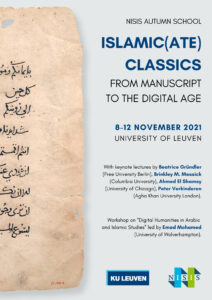
OSL/NISIS Workshop: “Muslim Words/World Literatures”
12 February 2021, Online
The online workshop “Muslim Worlds/World Literatures” was hosted in collaboration with the Research School for Literary Studies (OSL) and organized by Dr. Alberto Godioli (OSL, RUG) and Prof. Christian Lange (NISIS, UU).
The workshop consisted of three online sessions led by international experts in Islamic and/or literary studies: Dr. Petra de Bruijn (Leiden University), Dr. Hiyem Cheurfa (Lancaster University), Dr. Richard van Leeuwen (University of Amsterdam) and Dr. Liesbeth Minnaard (Leiden University).
Program
12:00-14:00: Seminar led by Dr. Richard van Leeuwen and Dr. Hiyem Cheurfa (on the reception and contemporary influence of One Thousand and One Nights)
15:00-17:00: Seminar led by Dr. Petra de Bruijn and Dr. Liesbeth Minnaard (on religion and secularism in 20th- and 21st-century literature)
17:15-17:45: Wrap-up activity and final remarks
NISIS Masterclass ‘The Past and Future of Islamic Studies’ #3: “Environmental Studies”
28 January 2021, Online
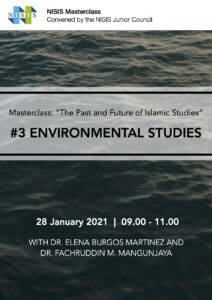
The third session of the NISIS Masterclass series “The Past and Future of Islamic Studies” took place on 28 January 2021. During this Masterclass session we zoomed in on scholars who have dedicated their work to ecological and urban environments.
Dr. Elena Burgos Martinez (LIAS, Leiden University) gave a lecture on “Water relations in maritime and island Islam: a brief journey through environmental dreams in Eastern Indonesian islands” and Dr. Fachruddin M. Mangunjaya (Universitas Nasional) spoke about “Developing Environmental Awareness and Conservation through Islamic Teaching” as well as “The Fatwa in Boosting Environmental Conservation in Indonesia.”
NISIS Autumn School ‘Shrine Cultures in the Islamicate World’
8-9 October 2020, Online
On 8 and 9 October 2020, our annual NISIS Autumn School took place. We want to thank Gabrielle van den Berg (Leiden University) and Dick Douwes (Erasmus University Rotterdam) for organizing this year’s school on “Shrine Cultures in the Islamicate World.”
On 8 October we listened to a wonderful keynote lecture by prof. Jo-Ann Gross (The College of New Jersey) about “The ‘Shrinescapes’ and Narrative Traditions of Khoja Isḥāq Khuttalānī.” Afterwards Habeeb ur Rehman (Aga Khan University London) and Ruben Elsinga gave a presentation about life at the Rehmania darbar, a large shrine in the city of Haripur in Pakistan, where Habeeb became the pir recently. The afternoon was closed with a panel discussion with Gabrielle van den Berg, Dick Douwes, Christian Lange and Elena Paskaleva. On 9 October we continued the Autumn School with a succesful Chapter Clinic during which six PhD candidates and RMA students received feedback on a chapter of their work. We want to thank all contributors for making this another great edition of our Autumn School!
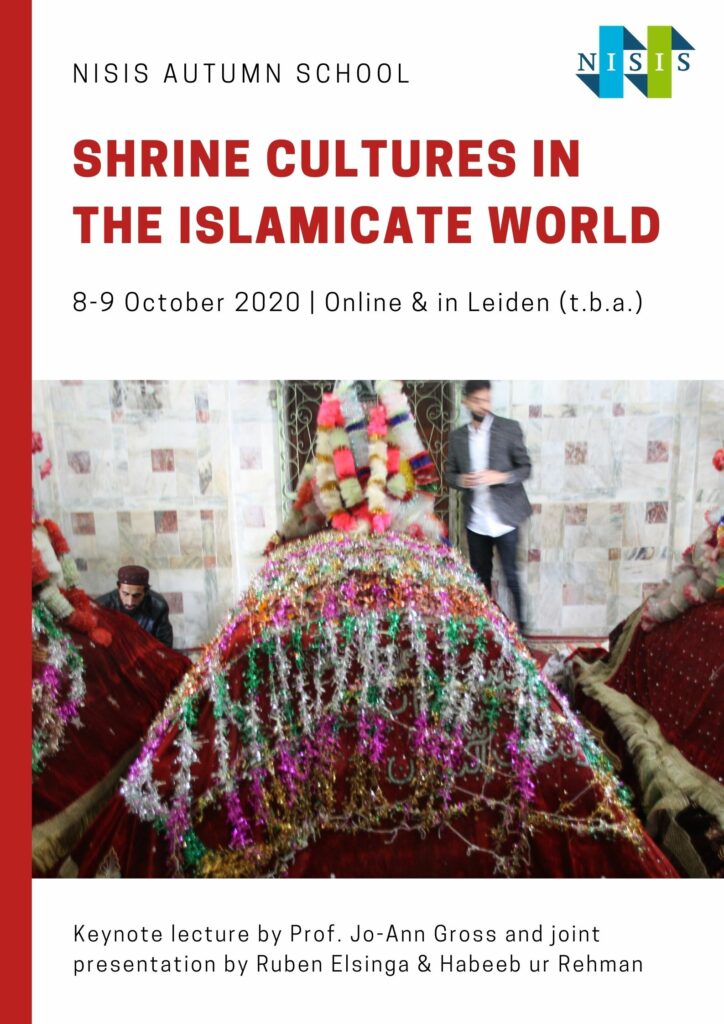
NISIS Masterclass ‘The Past and Future of Islamic Studies’ #2: “Arts and Media”
1 October 2020, Online
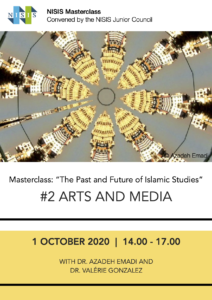
The second session of the NISIS Masterclass series “The Past and Future of Islamic Studies” took place on 1 October 2020. In this session we looked at Islamic art and media together with Dr. Valérie Gonzalez (SOAS University of London) and Dr. Azadeh Emadi (University of Glasgow).
NISIS Masterclass ‘The Past and Future of Islamic Studies’
#1: ‘Interdisciplinarity in the Study of Islam and of Islamic History’
7 July 2020, Online
On Monday the 7th of July, the first session of the NISIS Masterclass “The Past and Future of Islamic Studies” took place. The masterclass series is organized by the Junior Council, and its first session was themed “Interdisciplinarity in the Study of Islam and of Islamic History.” Lectures were given by dr. Edmund Hayes, prof. Aaron Hughes and prof. Christian Lange. Below you can find some snapshots of the online session. We want to thank all speakers and participants for their contributions.
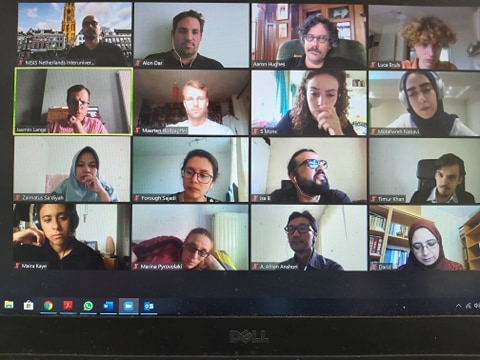
Program
14:00 – 14:15: Introductory remarks
Trends in Islamic studies in general — with a focus on insider/outsider, critic/caretaker — and how they pertain to the study of early Islam in particular. His talk will be followed by a round of discussion.
15:15 – 15:30: Break
Why it is relevant and important to study the Muslim hell (20-30 minutes talk followed by discussion). 16:15 – 17:00: Dr. Edmund Hayes
Shii Studies or Social history (20-30 minutes talk followed by discussion).
ENIS/MIDA Summer School: ‘Contesting Authority: Knowledge, Power and Expressions of Selfhood’
22-26 June 2020, Online
Keynote lectures were be given by Marjo Buitelaar (University of Groningen), Suad Joseph (University of California, Davis), Hilary Kalmbach (University of Sussex), Siobhan Lambert-Hurley (University of Sheffield), Arshad Muradin (Leiden University) and Muhammad Qasim Zaman (Princeton University). Furthermore, there was a masterclass by Albrecht Fuess (Philipps-Universität Marburg) and Gerard Wiegers (University of Amsterdam): “What is Islam?” Definitions and Interdisciplinary Approaches between the Middle Ages and the Digital Age.
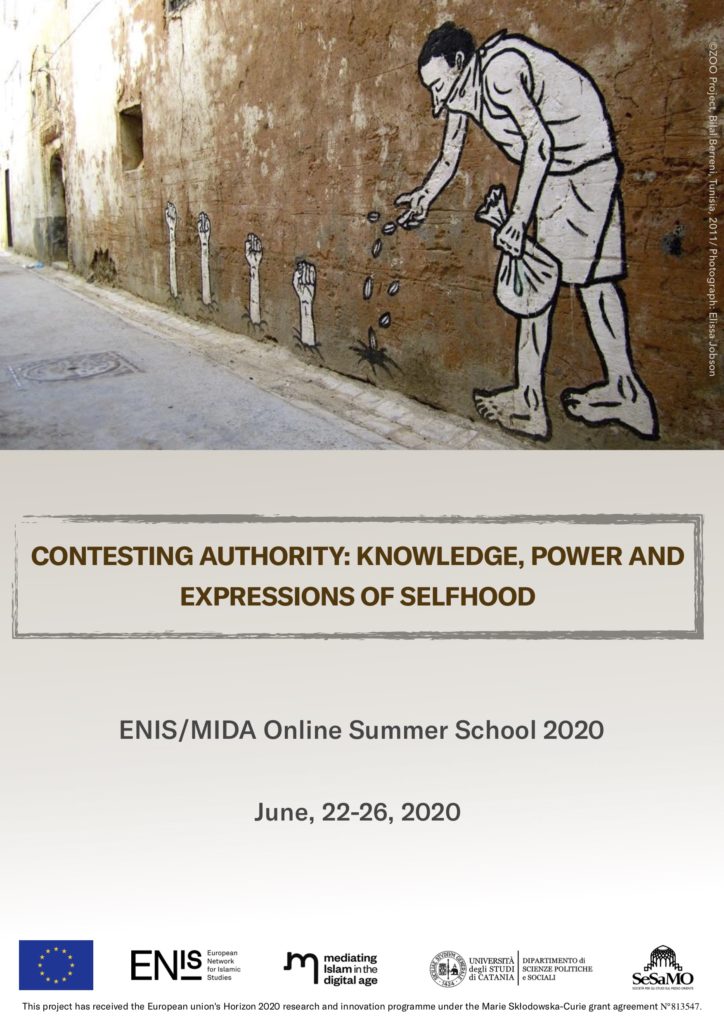
Seminar ‘Islam and Diversity’
17 January 2020, Maastricht University
NISIS organized the one-day seminar ‘Islam and Diversity’ in collaboration with Maastricht University in the beautiful city of Maastricht. It was a full program with many interesting talks and discussions. In the morning we listened to the keynote lectures given by PD Dr. Gabriele Dietze and Dr. Imen Gallala-Arndt, and in the afternoon we headed off to different workshops related to the topics of Law, Civil Society and Gender & Diversity. PhD candidates presented their work on varying topics like the lack of representation of black Muslim scholars in academia, legal practices of Sub-Saharan migrants in Morocco and new forms of Islamic authority in Belgium. Below are some impressions of the day. We want to thank all the participants for making this a wonderful event!
NISIS Autumn School ‘Islamic and Middle Eastern Studies in the Digital Age’
28-31 October 2019, Utrecht University
This year Utrecht hosted the NISIS Autumn School. We heard some sparkling keynotes: Cornelis van Lit and Jo van Steenbergen spoke about digital/computational methods, and did so in rather opposite terms (Cornelis: “You can do it!” vs Jo: “It’s great, but beware of DH amnesia!”). Mirjam Shatanawi, Mona Abdel-Fadil and Bettina Gräf addressed different aspects of doing Islamic Studies online (Mirjam talked about online repositories and museum catalogues, Mona about affect theory and how it can be used to analyze social media, Bettina about online fatwas and the pitfalls of web-based ethnography).
The workshop “Introduction to Digital Humanities” on Wednesday (with contributions from Cornels van Lit, Mehdi Sajid, developers Yusuf Celik and Dirk Roorda, and IT-officer Etienne Posthumus [Brill]) was very well-attended. It revealed how much potential there is in DH but also what kind of skills we, as digital-born (or at least digitally interested) reseachers, still need to develop – to be continued!
The fim screening (the documentary about Umar Ryad’s recently concluded ERC project on Muslim in interwar Europe) and the borrel we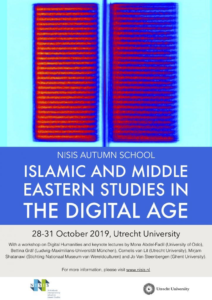 re a delight. And last but not least, we had some very robust panels with great contributions from junior NISIS members and guest PhD researchers. International participants came from the Emirates, France, Germany, and many other places.
re a delight. And last but not least, we had some very robust panels with great contributions from junior NISIS members and guest PhD researchers. International participants came from the Emirates, France, Germany, and many other places.
Thank you to all who came and contributed, even if it meant showing up to only one of the panels, keynotes, or borrels. NISIS is not something that we do “in addition” to all the other things we do, it is literally where Islamic Studies “happens” in the Netherlands. We are currently reevaluating the format of the Autumn School, to make sure we stay abreast of developments and offer content that is relevant to us all. So: watch this space!
ACMES/NISIS Workshop ‘Islamic and Middle Eastern Studies in Dialogue’
24 May 2019, University of Amsterdam
“Participating in the workshop “Islamic and Middle-Eastern Studies in Dialogue” provided me with valuable insights about the bridges and divides between the two disciplines. The variety of well-established speakers from different fields such as political science, anthropology, history and law showed us the methodological and theoretical diversity within the realm of Islamic and Middle-Eastern studies.”
– Semiha Sozeri, PhD candidate (University of Amsterdam)
Program
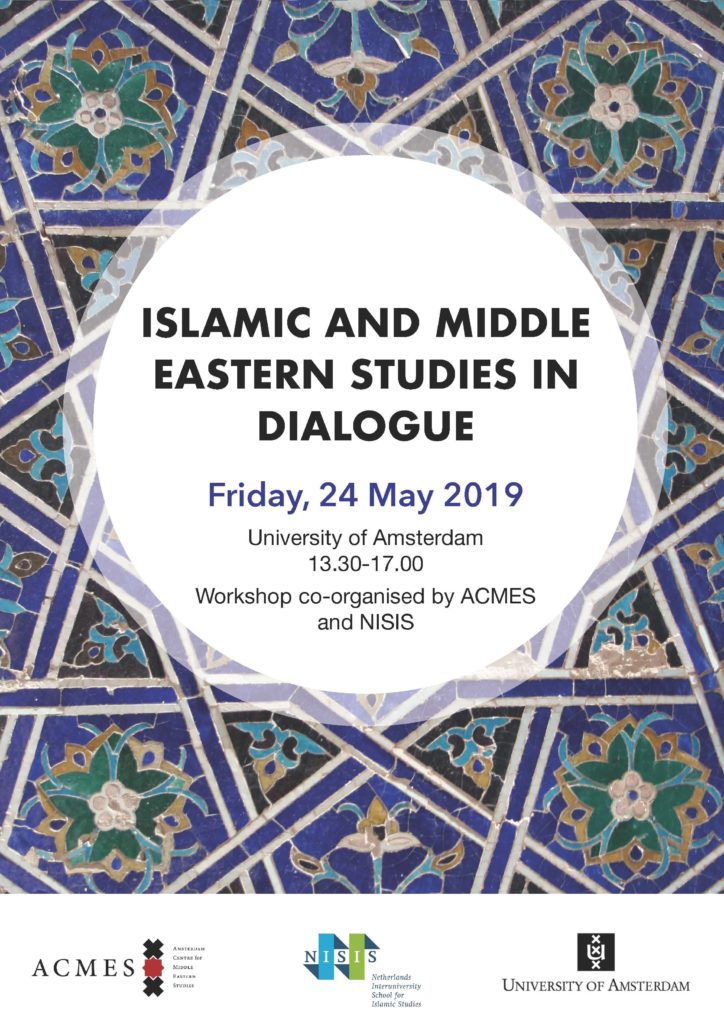
13.30-13.40: Welcome by Prof. Christian Lange
13.40-15.00: Session 1: Authority
Thijl Sunier (VU Amsterdam) and Farid Boussaid (UvA)
15.00-15.30: Coffee and tea
15.30-17.00: Session 2: Power
Maaike Voorhoeve (UvA) and Gerard Wiegers (UvA)
17.00: Drinks
NISIS Spring School ‘Patronage and Clientelism in the Muslim World’
18-22 March 2019, Granada, Spain
Pictures by Burak Fiçi and Aleksi Hämäläinen.
“The ENIS Granada Spring School 2019 was a wonderful experience for me. Besides meeting great professors and young scholars, the school taught me about how religions are deeply manifested in every corner of the city. The experience was breathtaking.”
– Anwar Masduki, PhD candidate (University of Groningen)
“The NISIS Spring School in Granada presented a fantastic opportunity to share my research in a supportive environment. Being able to network and discuss new ideas, as well as shared interests with an international group of scholars from various disciplines, is a priceless experience.”
– Aleksi Hämäläinen, RMA student (Utrecht University)
“The ENIS Spring School was the perfect opportunity to meet colleagues from all around Europe. It helped me greatly in advancing my own research.”
– Alon Dar, PhD candidate (Leiden University)
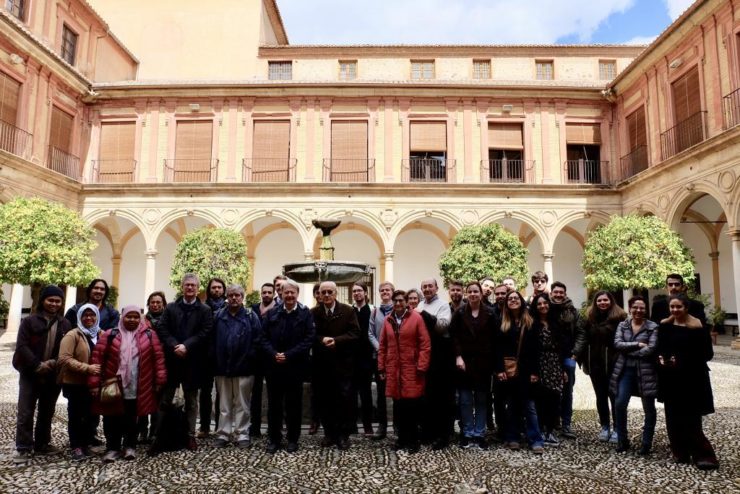
NISIS/NOSTER Network Meeting
8 February 2019, Utrecht University
